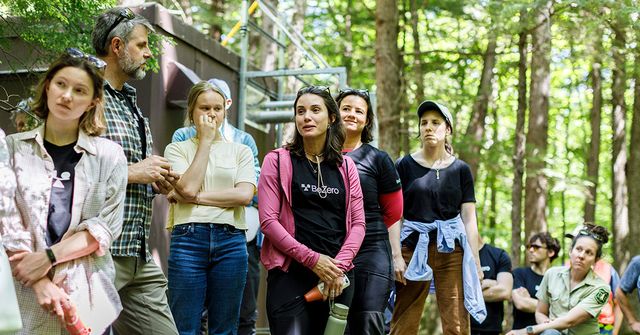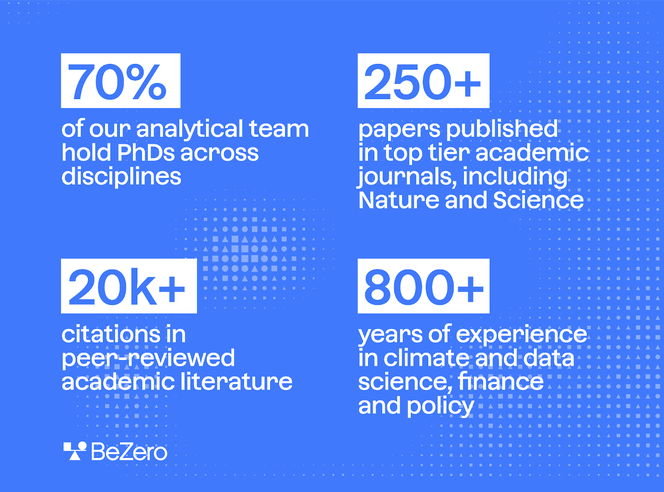
A first-rate team: meet BeZero’s uncompromising explorers
BeZero’s diverse team brings analytical rigour and a science-driven approach to carbon ratings.
Our 80+ full-time ratings analysts and geospatial scientists are committed to fair and independent project assessments, free from vested financial interests.
Analytical integrity at BeZero is paramount because project ratings may impact the flow of carbon finance towards communities on the ground.
One of our clients once said: ‘I came in ready to fight you guys over your carbon ratings, but you made some very valid points and convinced me’.
This sentiment is a testament to our team’s uncompromising care and diligence, and something we hear a lot. BeZero’s analysts listen carefully to all the input they receive and stand their ground, relying on their scientific rigour and objectivity to ensure a fair assessment of climate projects of all types.

Pioneering a new business model within a nascent, burgeoning industry requires open-minded and disruptive thinking. Half the job titles at BeZero didn’t exist three years ago - there was no such thing as a ‘carbon ratings analyst’ or a ‘carbon sector lead’.
We’ve built a fresh way of thinking about carbon projects by fusing financial research practices with environmental sciences and technology.
This explainer offers a window into the people behind our ratings, illustrating their analytical expertise and unwavering commitment to accelerating climate action.
Our ‘AAA’ team
BeZero’s analytical team brings together champions of conservation, climate and Earth scientists, physicists and engineers, pioneers in geospatial analysis and artificial intelligence, and veterans of environmental policy and financial research.
Led by Chief Ratings Officer Dr Spencer Meyer, an expert in climate science and carbon markets with 20+ years’ experience developing nature-based solutions, our 80+ strong (and growing) team are at the forefront of their respective fields, having worked in some of the world’s leading academic and research institutions, companies, and public authorities.
No other carbon ratings agency houses as much breadth and depth of technical expertise across carbon sectors and geospatial analysis. The diversity of disciplines at BeZero not only enhances the analytical rigour of each project rating, but also fosters an environment of curiosity and a science-driven approach.

Our scientists genuinely care about getting their analysis right, because their work carries real-life responsibility. Carbon finance often supports local communities and ecosystems, not to mention major investment decisions, so there’s an imperative to ensure high-impact projects are being duly recognised on their merits.
The team has no vested financial interests in the outcome of a rating. Their primary concern is to get to the bottom of one question: is this project living up to its carbon promises? This integrity brings unique credibility and rigour to everything we do.
Our ratings analysts stand their ground
The Ratings team is the largest at BeZero. They combine a wealth of experience to ensure the analysis behind each rating is stress-tested from multiple perspectives through rigorous peer-review
Dedicated sector leads with expertise in areas such as blue carbon, cookstoves, energy, engineered carbon removals, forestry, and soil science oversee the design and maintenance of sectoral frameworks to capture the nuances of different project types. You can learn more about our analytical approach here.
This detailed analysis leaves no stone unturned, providing carbon buyers with deep insights into the quality of carbon projects. As our Director of Carbon Ratings Dr Kirti Ramesh puts it, ‘Sometimes it feels like our ratings analysts are just like a team of detectives. On a good day, they’re finding lots of clues.’

Our analysts aren’t here to sell ratings. Their remit isn’t tied to revenues. Their job is to ensure that we are analytically fair in our project assessments so that BeZero can help the market advance quality overall.
To illustrate this integrity in action, consider the following case study:
A global tech company looking to invest a considerable sum into an Improved Forest Management project requested a BeZero Carbon Rating for the project.
When the assessment was complete, our client was disappointed in the lower-than-expected rating, and requested a call to discuss the analysis.
While BeZero itself cannot make any recommendations on carbon credit purchases, our client invited their external consultant and their broker to the call.
Our forestry analysts ran through their assessment, explaining the main sources of risk which led to the relatively low rating.
Despite disagreements on some technical points with the client’s broker - who had a vested interest in the purchase going through - BeZero’s objective analysis was valued by all parties, and the call concluded on a note of mutual respect.
Later, the associated standards body approached BeZero to learn from our analysis and make improvements to its standards based on our findings.
This example shows why independent ratings are so important - our analysts relied on their scientific expertise and our transparent risk framework to stand their ground and defend their analysis, free of any conflicts of interest.
How our geospatial team unearths carbon risk
Our world-class geospatial function, led by Dr Phil Platts, combines more than 150 years’ experience across different academic, research, and government institutions, including NASA, the European Space Agency, Brazil’s National Institute for Space Research, the Indian Space Research Organisation, and the United Nations Satellite Centre, as well as non-profits such as the Woodland Trust and the Amazon Environmental Research Institute, and companies such as Planet, GHGSat, TomTom, and Indigo Ag.
The team employs cutting-edge techniques, combining remote sensing, field ecology, machine learning, and geostatistics. Satellite data plus a wide range of other geospatial information feeds into our in-house models, helping us to understand how ecosystems and land use are changing over time, the extent to which observed changes could be attributable to project interventions, and how evolving natural risks such as fire, drought, cyclones and sea level rise could impact projects in the future.
To understand uncertainties in our data, we make extensive use of LiDAR, high resolution commercial imagery, tens of thousands of uniquely curated ground-measured carbon plots, and collaboration with research partners around the world.
It’s a multi-disciplinary effort that goes beyond what we can see from space, drawing on our deep expertise across continents and scientific disciplines.
Hear from Phil as he describes his background in conservation science, and why he made the transition to carbon markets to help drive change where it’s most needed:
A data-driven approach
Our Data team, comprising data analysts, scientists, engineers with diverse expertise in fields such as computer science, statistics, astrophysics, geography, and ecology, is as committed to enabling climate action as our ratings analysts are.
Led by our VP Data Science & Engineering, Tobias Richter, the team not only focuses on collecting essential data for our ratings processes, but on building tooling on top of this data that empowers our Ratings and Geospatial teams.
One of the biggest hurdles we face is dealing with unstructured data. Information in the voluntary carbon market varies greatly in format and structure, making it complex to manage and analyse. That’s where we bring value, both internally and externally.
We work to structure information from data sources across the market, ensuring the same data points are available in a consistent format across different projects. This standardisation streamlines our processes and improves the accuracy of our ratings.
Part of the Data team’s value also lies in automating processes to enhance the quality of our assessments. For example, our analyst ‘workbench’ brings together all the different data sources spanning project documents, scientific literature, Earth observation data, industry research, and economic reports into a single portal, meaning all relevant information is at the Ratings team’s fingertips.
It’s about working smarter, not just harder, to deliver reliable ratings.
Learn more about the importance of dependable data for project analysis and effective climate action in the video below:
Collaboration is key
We believe in the importance of collaboration and open dialogue to help build trust in carbon credits. Across the carbon value chain, our teams are in constant communication with project developers, standards bodies, market integrity initiatives, investors, regulators, and government.
Engaging with project developers is a fundamental aspect of our ratings process. This engagement facilitates better project data disclosure, deepens our Ratings team’s understanding of the challenges developers face, and in some instances allows us to refine our analytical process.
We strive to ensure that project developers are well-informed about our ratings framework. We want them to understand what they are being assessed against, which is why we maintain an open line of communication. This collaborative approach underscores our commitment to transparency and improving quality in carbon markets.
As well as attending events to meet project developers in person, we regularly hold developer webinars to improve information disclosure, and instil confidence in our ratings process. Learn more about our developer engagement.
Unrivalled passion, unwavering integrity
Independent carbon ratings and rating agencies matter because they allow anyone to assess the quality of any type of carbon project, at any stage, anywhere. They are essential to delivering effective climate action.
Thousands of people reference our ratings, a testament to the analytical work done by our full-time ratings analysts and geospatial scientists. Our team’s passion and integrity are unrivalled, and their work can carry real-life responsibility. After all, a low rating may impact the flow of carbon finance towards communities on the ground, and we take this very seriously.
As the most widely adopted risk metric in the market, companies use our ratings to independently verify what their advisors are recommending, what a developer is claiming, or how a broker is pricing a credit. BeZero’s analysis is trusted by five of the top 20 Fortune 500 companies, including some of the world's biggest tech giants, energy houses and investment banks.
Enhancing your climate strategy through immediate, credible, and defensible climate action has never been easier. Start your journey by accessing BeZero’s ratings on our public platform, and explore thousands of project listings and hundreds of insights on all things carbon.